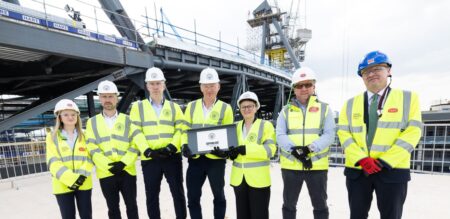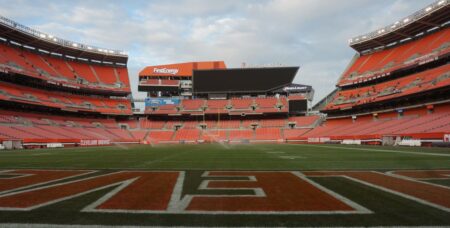Tennessee Titans have received final approval from city officials to move forward with plans to build their new $2.1bn (£1.7bn/€2bn) stadium in Nashville.
Metro Nashville Council issued the final approval yesterday (Wednesday) for the 60,000-capacity enclosed stadium set on the city’s East Bank, which is set to open in 2027. The plan was passed by a vote of 26-12, coming three weeks after the Metro Nashville Sports Authority, the owner and landlord of both the Titans’ Nissan Stadium and new venue, unanimously approved the agreement.
The new stadium agreement, agreed last October, includes a new 30-year lease and non-relocation agreement between the National Football League (NFL) team and the Sports Authority. Groundbreaking is expected to occur in early-to-mid 2024, with the Titans to continue to play at nearby Nissan Stadium until the new arena opens.
The Titans are responsible for $840m of stadium funding, which includes a $200m contribution from the NFL, and any cost overruns, while $500m will come from a contribution from the State of Tennessee.
The remaining $760m of the $2.1bn budget will come from revenue bonds issued by the Metro Sports Authority to be repaid through levies such as hotel and stadium sales taxes. This is te largest public spending contribution on an NFL stadium to date
Burke Nihill, the Titans’ president and chief executive, said: “Today marks a huge milestone for both the Tennessee Titans organisation and the City of Nashville as we move forward with plans for a new stadium.
“We are extremely excited about this building’s ability to host the world’s best and greatest events, but this agreement is about so much more than a stadium. This is a generational opportunity to address our city’s priorities and ensure its health and vitality for the next 30 years. Our city and our state have bright futures ahead, and we’re humbled by the opportunity to continue to be a part of it.”
The terms of the new agreement remove the an obligation, agreed in 1996, for Nashville’s General Fund to maintain and upgrade the stadium and returns 66 acres of land to the City of Nashville previously restricted by parking lots until 2039. This obligation is believed to have been a burden of $2bn for local taxpayers.
The city has announced plans to include the returned property in the creation of a new neighbourhood set along Nashville’s Cumberland River. The neighbourhood, through new revenue sources generated by its development, is projected to bring in over a billion dollars to Nashville’s General Fund over its first 30 years of development.
The team will also contribute nearly $48m over the life of the lease to the Nashville Needs Impact Fund, a fund directed by the Metro Council to support city needs such as public education, public transit, affordable housing, and several other areas.
Nashville Mayor John Cooper said: “Tonight is a huge win for Nashville taxpayers. We’ve eliminated a billion-dollar liability created by an aging stadium lease and created a platform for the city to thrive for decades.
“This was always about more than football. This vote unlocks the East Bank Vision for Nashville’s next generation. It enables a true smart growth plan for the decades ahead. It will expand our transit network, create affordable housing, build parks and civic space, activate the waterfront, and drive resilience and sustainability.”
The stadium is currently estimated at 1.75 million square feet, with a capacity of approximately 60,000. It is anticipated to bring in year-round events, with aspirations to host Super Bowls, NCAA Final Fours, College Football Playoffs, Wrestlemanias, and other major shows. The venue will also continue to host Tennessee State University home football games.
The stadium, designed by Manica Architecture, will include a 12,000 square foot community space to host classes for local schools, job trainings, and other community-minded events.





